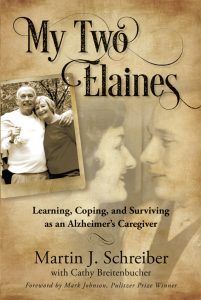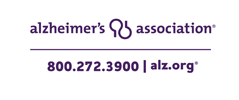***

Caregiving for people with dementia cuts across every demographic group you can think of. It is the job of the well-educated (more than 40 percent have at least a college degree), as well as those with modest incomes (41 percent have a household income of fifty thousand dollars or less).
One-third of Alzheimer’s caregivers are, like me, over the age of sixty-five. But some caregivers are young children. A 2005 study by the National Alliance for Caregiving found that 250,000 kids in this country between the ages of eight and eighteen provide help to persons with Alzheimer’s or another form of dementia.
As you become an Alzheimer’s caregiver, you do so without the benefit of training. Those professional home health aides I mentioned a minute ago? Federal regulations require seventy-five hours of training to get a job with a Medicare-certifed home health agency, according to the Paraprofessional Healthcare Institute. (In my home state of Wisconsin, it’s 120 hours). For family caregivers, though, it’s learning on the job, a baptism by fire.
Being an Alzheimer’s caregiver takes a tremendous toll, but it happens in such a gradual way that you may not notice how harmful it is to you. Exercise? Eat healthy?
Who has time for that? Managing your own health can be that “one more thing” you can’t squeeze into a day that’s already filled up with doctor appointments, newly inherited household chores, and possibly your own job responsibilities.
Trudging up the Alzheimer’s mountain can sap all your physical and emotional strength. But I am here to tell you that you must make it a priority to be healthy yourself in order to be an effective caregiver. This is not negotiable. How do you keep yourself healthy? You get help. You take classes. You talk to people who have been through this. You cannot do it alone, as I tried to do. The proof is in the numbers and illustrated by my own experience.
Consider this: people with Alzheimer’s who are sixty-five and older survive, on average, four to eight years afer their diagnosis. Some live with the disease as long as twenty years. When your caregiving burden means you give up a healthy lifestyle, you’re stacking the odds against yourself, leaving you with the sickening possibility that your partner with Alzheimer’s will outlive you. That’s got to be one of the cruelest twists of this terrible disease.
Maybe you’ve read the “Twelve Steps for Caregivers” by Carol J. Farran and Eleanore Keane-Hagerty, who have studied and written about Alzheimer’s and caregiving for years. It’s based on the many twelve-step programs for people with addictions and has been around since 1989, when it was published in an Alzheimer’s-related medical journal, and it still pops up on websites, blogs, and social media. Right there in black and white it says a caregiver should recognize this: “I need to take care of myself.” It was good advice twenty-five years ago, and it’s good advice today.
Think of the emergency instructions you get on an airplane—you have to put on your own oxygen mask before you can help others with theirs. No matter how much you love your partner, you can’t take good care of him or her if you don’t first take good care of yourself. I didn’t realize how important that was until it was almost too late. I don’t want that to happen to you.
When Elaine was well, and even after she first was diagnosed, I’d work out many weekday mornings with my friends. But as her mental decline continued, her body clock was a affected, and that of course threw off my own sleep. If she was awake, I felt I should be awake too to make sure she wasn’t wandering around or doing something unsafe. Sometimes, she’d ask and re-ask me questions but not any old questions. Instead, her queries packed an emotional punch.“Are we married?” “Do we have children?” “Do I have Alzheimer’s?” “Is it bad?” “Why do I have it?” Just try getting back to sleep after that!
By the time we got up for the day, many times, she’d be confused and agitated . . . and I’d be exhausted and cranky. I simply couldn’t leave her home alone in the morning to go to the health club. One missed workout led to another and another and . . . The theme from Rocky, the William Tell Overture, and “On Wisconsin” combined would not have been enough inspiration to push me out the door. Over the span of a year and a half, I put on twenty pounds.
Elaine, meanwhile, also put on weight, probably eight or ten pounds. Sometimes, she couldn’t remember whether she’d eaten lunch. When in doubt, she’d make herself a peanut butter and jelly sandwich.
Carrying that extra weight—and I don’t just mean the pounds—meant I couldn’t even go up the stairs at home or my office without having to stop and catch my breath. Even when I was just walking, I often got short of breath. (My temper ran short, too . . . more on that in chapter 5.)
I already was a cancer survivor, having been diagnosed in 2006 with non-Hodgkin’s lymphoma. I went through six cycles of chemotherapy over a six-month period with side effects that included low energy, nausea, and hair loss. Still, I remained confident that the treatment would work. And it did. So while I hated the idea of more clinics and exams for myself, I had to get some answers. The doctors quickly focused on a variety of heart issues.
Over a three-and-a-half-year span, from 2009 through late 2012, I underwent several procedures and also had a pacemaker installed. Still, I never felt quite right. I rang up more than $260,000 in medical bills as various doctors took their turns examining me, ordering tests and lab work, and even having me admitted. My wife was the one who was sick. Why was I the one in the hospital? My doctors blamed COPD (chronic obstructive pulmonary disease, a progressive lung disease), asthma, excess fluid in my upper chest, sleep apnea, and even a rare type of high blood pressure that a affects arteries in the lungs and in the heart. Or maybe it was a combination of sheer exhaustion, acute anxiety, depression, and grieving.
No doubt about it, I was breaking down physically and emotionally. Would I ever learn to protect my own health? Yes, I wanted to take care of my wife, but I didn’t want to be a dead hero. So, in December 2011, I finally contacted the Alzheimer’s Association for help. Through the association, I met another Alzheimer’s caregiver who became my mentor. He told me he’d had a heart attack, despite having no history of heart disease. That was all the wake-up call I needed. At long last, I was open to using the association’s resources and suggestions.
Everyone is familiar with the concept of an adrenaline rush, a burst of energy that we associate with a fight-or-flight stress, cortisol just keeps flooding into our bodies. Without physical activity or other stress-busters, the levels just stay high and wreak all sorts of havoc. According to the Mayo Clinic, stress is linked to heart disease, mental illnesses, digestive problems, sleep problems, weight gain, and—here’s the ironic one for Alzheimer’s caregivers—memory and concentration impairment. I’ve heard some health experts call chronic high stress a ticking time-bomb. At least now I know my enemy’s name: cortisol.
Here’s some more science. A team at Ohio State University and the federal National Institute of Aging spent nearly three decades investigating the links between psychological stress and a weakened immune system. The study, released in 2007, was much more than a survey. It included a comparison of blood samples of Alzheimer’s caregivers to those of non-caregivers that revealed a difference at the genetic and molecular level. The scientists concluded that the chronic stress of Alzheimer’s caregiving may shorten spouses’ and children’s lives by as much as four to eight years. Think about that: that’s four to eight years you won’t see your grandkids grow up.
The Mayo Clinic, Ohio State University, and the NIA aren’t alone in looking at the possible links between Alzheimer’s and caregiver health.
What I wish I’d done
I should have started earlier to search out adult daycare so that I could reclaim part of the day for myself, including time for exercise.
Everyone is familiar with the concept of an adrenalin rush, a burst of energy that we associate with a startling, fight-or-flight event. It turns out other hormones also are released into the body in stressful situations. One of these is cortisol. It was useful to cavemen who had to outrun an attacking animal. But in our modern world, we rarely need that extra spurt of energy and actually find it works against our survival. When we live with constant stress, cortisol just keeps flooding into our bodies. Without physical activity or other stress-busters, the levels just stay high and wreak all sorts of havoc. According to the Mayo Clinic, stress is linked to heart disease, mental illness, digestive problems, sleep problems, weight gain, and — here’s the ironic one for Alzheimer’s caregivers — memory and concentration impairment. I’ve heard some health experts call chronic high stress a ticking time-bom. At least now I know my enemy’s name: cortisol.
Here’s some more science. A team at Ohio State University and the federal National Institute of Aging spent nearly three decades investigating the links between psychological stress and a weakened immune system. The study, released in 2007, was much more than a survey. It included a comparison of blood samples of Alzheimer’s caregivers to those of non-caregivers that revealed a difference at the genetic and molecular level. The scientists concluded that the chronic stress of Alzheimer’s caregiving may shorten spouses’ and children’s lives by as much as four to eight years. Think about that: that’s four to eight years you won’t see your grandkids grow up.
The Mayo Climic, Ohio State University, and the NIA aren’t alone in looking at the possible links between Alzheimer’s and caregiver health.
It’s certainly a hot topic for anyone interested in health care reform and holding down expenditures. Back in 2010, economist Brent Fulton from the University of California, Berkeley, determined that Alzheimer’s caregivers spend 8 percent more on health care than non-caregivers. In a more recent estimate, the Alzheimer’s Association calculated that in 2015 the physical and emotional impact of dementia caregiving in the United States resulted in an estimated $10.2 billion—again, billion with a b—in health care costs.
As the research continues to reveal the unfortunate implications for the health of Alzheimer’s caregivers, you continue to climb the Alzheimer’s mountain.
To me, being an Alzheimer’s caregiver is like being the fictional boxer Rocky Balboa in a pitched battle against a much stronger opponent. The disease can back you into a corner. You have to maintain your footing as you swing away. You’re trying your damnedest to fight back while also struggling to control your own emotions. At the same time, you’re absorbing some awful body blows like depression, anxiety, and grief. Each time there is another indication that your partner’s mind is being affected, it’s another blow.
Unlike Rocky, you’ll never be able to defeat Alzheimer’s, and if you’re not careful, those blows, bit by bit, will defeat you in the trying. Work to understand the illness, and get the help and support you need to respond to it. That’s the best path up the mountain.
###


